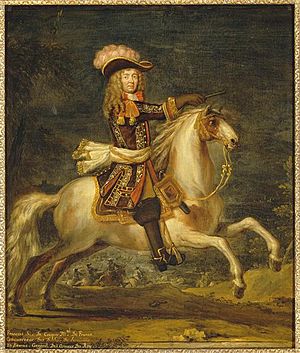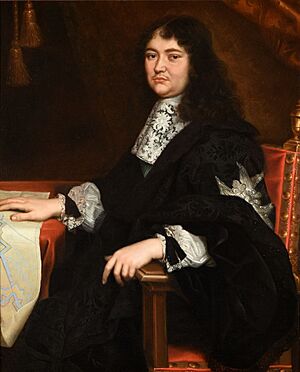Battle of Ortenbach facts for kids
Quick facts for kids Battle of Ortenbach |
|||||||
|---|---|---|---|---|---|---|---|
| Part of Franco-Dutch War | |||||||
 The Barrage Vauban across the Rhine at Strasbourg; the 1678 campaign ensured French control |
|||||||
|
|||||||
| Belligerents | |||||||
| Commanders and leaders | |||||||
| Strength | |||||||
| 15,000–18,000 | 20,000–30,000 (maximum) | ||||||
| Casualties and losses | |||||||
| minimal | minimal | ||||||
| The precise derivation of 'Ortenbach' is unclear but is the title given by historian John Lynn and others. | |||||||
The Battle of Ortenbach (also called the Battle of Gengenbach) happened on July 23, 1678. It was fought in what is now Baden-Württemberg, Germany. This battle was part of the final stages of the Franco-Dutch War (1672-1678). The French army was led by François de Créquy. The other side, the Imperial force, was led by Charles V, Duke of Lorraine.
Even though it was more of a small fight than a big battle, Ortenbach was very important. It helped France take control of Alsace. They also captured Kehl and the important river crossing near Strasbourg on the Rhine River. The war ended in January 1679 with the Treaty of Nijmegen. France officially took over Strasbourg in 1681.
Contents
Why the Battle of Ortenbach Happened

To understand the Battle of Ortenbach, we need to look at the bigger picture. The Franco-Dutch War started in 1672. It began because King Louis XIV of France felt the Dutch Republic was ungrateful. France had helped the Dutch before.
At first, France seemed to be winning easily. But then, the Dutch got help from other powerful groups. These included Brandenburg-Prussia, Emperor Leopold, and the Spanish Empire. This created a new front in the Rhineland area.
Even though the French were outnumbered, their clever general, Turenne, helped them keep control of Alsace. This was a very important territory.
Changes in Command and Strategy
In 1675, General Turenne died. This made the French army play defense for a while. In 1676, the Imperial forces took back Philippsburg. This gave them control of the Rhine crossing at Strasbourg.
But in 1677, a new French commander, de Créquy, took over. He was very good at moving his army around. He stopped the Imperial forces from invading Alsace. He even won a small battle at Kochersberg. Then, he captured Freiburg im Breisgau.
As peace talks were happening, King Louis XIV wanted to make France stronger. He told de Créquy to avoid big battles. His main job was to keep Freiburg.
Preparing for the Fight
In the spring of 1678, de Créquy gathered his troops at Scherwiller. He was joined by another army led by Schomberg. Meanwhile, Charles of Lorraine was building a large army near Offenburg. He wanted to take back Freiburg.
De Créquy tried to distract Charles. He moved his army towards Rheinfelden. Charles sent 7,000 men to help Rheinfelden. But the French attacked them as they crossed a river. Many Imperial soldiers drowned, and many were captured. After this success, King Louis XIV gave de Créquy permission to attack Charles's main army if he saw a good chance.
The Battle of Ortenbach

Throughout the war, the French army had a big advantage. Their supply system, created by Louvois, was excellent. This allowed French armies to move faster. They could even start campaigns in winter. Armies usually stopped fighting in winter because it was hard to find food for horses and supplies.
The French also made it hard for their enemies to get supplies. They blocked routes and destroyed towns and farms. This was especially helpful in the Rhineland. The Imperial armies often struggled to get enough food and ammunition. They depended on being close to the Rhine River for supplies.
In 1677, the Imperial army suffered greatly from sickness and hunger. This was because their supply lines were stretched thin. They had to march and counter-march constantly. Freiburg was captured by the French because the Imperial army was too weak to defend it.
The Clash at Kinzig
De Créquy used a similar plan again. He left Choiseul at Rheinfelden. Choiseul's job was to clear out any remaining Imperial strongholds. He also burned down Bad Säckingen. De Créquy then returned to Bad Krozingen, south-west of Freiburg.
By mid-July, most of the Imperial army was spread out. They were between the villages of Gengenbach and Lahr. Their forward troops were at Denzlingen.
Just like the year before, the Imperial army started to fall apart. Many soldiers got sick or ran away. This forced Charles to pull his troops back. He moved them behind the Kinzig River. This river is a natural defense line in front of Offenburg.
On July 23, the French tried to cross the Kinzig River. But the Imperial cavalry stopped them. This fight is what we call the Battle of Ortenbach. Charles did not want to commit his entire army to a big battle. He retreated to Oberkirch. But this meant he was cut off from the Rhine River. On July 27, de Créquy captured Kehl. He also took its bridge over the Rhine and the nearby fort of Etoile.
By mid-August, the Dutch Republic and Spain had already ended the war. But Emperor Leopold kept delaying. He hoped to get back some of his lost territories. Charles crossed back to the left bank of the Rhine at Philippsburg. But de Créquy was there again, blocking his way. In late September, Charles gave up and moved his army to the Electoral Palatinate. This ended the campaign.
What Happened After the Battle
In January 1679, the Treaty of Nijmegen was signed. France was allowed to keep Kehl and Freiburg-im-Breisgau. Emperor Leopold then made his German allies unhappy. He tried to demand that he be given the Free Imperial Cities of Gengenbach, Zell-am-Harmersbach, and Offenburg as "payment." But he did not succeed.
Strasbourg was very important because it was the entry point into Alsace. King Louis XIV decided he needed to take it. De Créquy's campaign in 1678 allowed him to surround the city if needed. On September 30, 1681, French troops marched into Strasbourg. France's control of Strasbourg was confirmed by the 1697 Treaty of Ryswick. However, in return, France had to give up territories on the other side of the Rhine, including Kehl and Freiburg.
Images for kids
 | May Edward Chinn |
 | Rebecca Cole |
 | Alexa Canady |
 | Dorothy Lavinia Brown |

